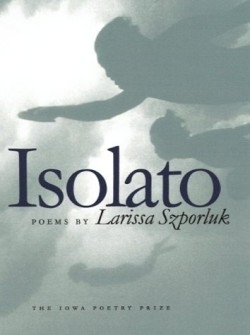Isolato (Iowa Poetry Prize)
Isolato reminds its readers that poetry is not anything else. Not narrative, not images, certainly not ideas, although Szporluk’s poems include compressed narratives and intense imagery and overflow with all sorts of wild, disturbing ideas. Their aim, however, is not to tell stories or provide pretty pictures or think “interesting” thoughts. In the tradition of Emily Dickinson and the great modernist poet H. D., these poems seek to explore states of being and consciousness that are just barely accessible to human language. They are demanding but rewarding, dazzling in their strange confidence and confident strangeness.
“Present, don’t describe,” Ezra Pound famously said, and Szporluk avoids mere description as resolutely as she engages with her enigmatic, fabulously detailed exterior and interior landscapes. Poem after poem begins with startling perceptions: “It is dark inside the body, and wet, / and double-hearted. There are so many ways / to go, and not see, and lose…” The effect is dream-like in some ways, but with a lucidity and clarity, a sure-footed stepping across multiple levels of narrative, image and reflection, that dreams rarely sustain. Fortunately, one can return to the poems as often as one likes. Dense and elliptical as they are, they reward multiple readings, with each new experience of a poem yielding up more of its substance.
Much contemporary poetry seems to have gravitated either toward rather easy, prosaic narrative or the true opacity of “language” poetry. Both modes surrender something essential but difficult: as Wallace Stevens wrote, “The poem must resist the intelligence almost successfully.” The poem must resist its readers, but must also yield something of worth, and it is this difficult line that Szporluk consistently, almost miraculously, manages to walk. A poem like “Deer Crossing the Sea” requires more than one reading to recognize that it is indeed, quite simply on one level, about deer swimming across a sea. It is also, however, “about” something much larger, which might be described as a yearning for some transcendent otherness. The literal swim becomes a metaphor for a less physical journey: “no one / or nothing can quit once the body gets wind / of an eden.” Without abandoning or sentimentalizing its subject, the poem opens far beyond it as well: “the promise of nectar haunts / them forever, the shore pecked out / of their eyes, and there, in its stead, / something greater to catch, / a scent that would paralyze God.”
To say that Szporluk is preoccupied with the traditional lyric subjects of love and death and yearning would be true, in the same way that it would be true to say that Jimi Hendrix played electric guitar. The quality of invention within the tradition is what separates the dutiful practitioner from the true artist. In Szporluk’s partly whimsical, partly angry, quasi-feminist version of “Jack and the Beanstalk,” for instance, Jack fails to come back down, lurking outside to listen to his father toying with his magic harp. His angry mother, tired of waiting, finally “cuts off the vein / to their faraway songs with an axe.”
More substantial is the series of poems titled “Seven Maria,” after the “seas,” or maria, on the surface of the moon. Szporluk rewrites the hoariest, most shop-worn associations between love and the moon, providing constant surprises while maintaining just enough continuity of theme and narrative to avoid seeming merely arbitrary. The seas of the moon are entangled with barely glimpsed stories and relationships that shimmer like moonlight on water: “What did the girl do, / peering at the ruin of her good seducer, / whose rise-and-fall phenomenon / turned her on to it like opium / and left the only question in the blasted air: More or less, / which is to be master?”
Szporluk’s first full-length book, Dark Sky Question, won the 1997 Barnard New Women Poets Prize. This second book is richly deserving of its Iowa Poetry Prize. Consistently unpredictable, dazzlingly unconventional, Isolato goes further toward establishing Szporluk as one of the most individual and resonant voices among the new poets now emerging.
Reviewed by
Jeff Gundy
Disclosure: This article is not an endorsement, but a review. The publisher of this book provided free copies of the book to have their book reviewed by a professional reviewer. No fee was paid by the publisher for this review. Foreword Reviews only recommends books that we love. Foreword Magazine, Inc. is disclosing this in accordance with the Federal Trade Commission’s 16 CFR, Part 255.

